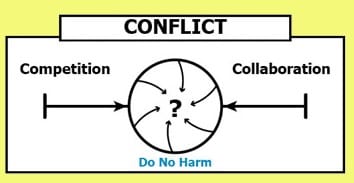Karl Marx espoused that socio-economic systems such as capitalism and democracy produce internal conflicts due to power differences (class struggles) which eventually lead to their implosion.
The history of all hitherto existing society is the history of class struggles. [. . .] in a word, oppressor and oppressed, stood in constant opposition to one another, carried on an uninterrupted [. . .] fight that each time ended, either in a revolutionary re-constitution of society at large, or in the common ruin of the contending classes. (Karl Marx & Friedrich Engels, The Communist Manifesto, 1848)
A more contemporary theory emerged from Charles Wright Mills (1916-1962) who claimed people’s differing interests and resources (the basis of competition) create conflict which is further influenced by the “unequal distribution of power and resources in society.” Gene Sharp, Nobel Peace Prize nominee, furthered our understanding of power by claiming that without obedience, leaders have no power. His belief that power is not intrinsic to the seemingly powerful, but given through obedience has influenced resistance movements around the world, most recently toppling the power-based regimes of Egypt and her sister nations in the Middle East.
It is no wonder the world’s current economic system driven by competition (a paradigm of unequal distribution of power and resources) seems to be imploding. More remarkably, everywhere we turn we hear the term collaboration (collective action/creation) bandied about as a necessary principle for surviving and thriving in today’s complex business arena. I wonder if those who echo the adoption of this alternate paradigm understand how our very being will be transformed with its adoption.
Howard Rheingold outlines six principles for successful collaboration. I added a seventh*.
1. Easy to use
2. Enables connections
3. Open – no license needed to publish
4. Group forming
5. Self-instructing
6. Leverages self-interest
7. Serves a higher purpose* — alleviates suffering, inspires awakening
Greg Giesen further stated these requirements –
1. Parity among participants (equal partners regardless of title/position/income)
2. Common goals (benefit all parties involved)
3. Shared responsibility for participation and decision making (everyone’s input and everyone’s support)
4. Shared resources (for the betterment of the project at hand)
5. Shared accountability for outcomes (equitable division of labour, expectations and timelines)
6. Mutual trust (open and honest communication and reliance on each other)
Even though collaboration has existed in the corporate world for several decades, sharing power and resources were feared as too risky by the majority of employers. Today, I am suggesting the opposite is true. It is too risky not to collaborate. From solo entrepreneur to multi-national corporation, if we are not collaborating with our shareholders and stakeholders (customers, competitors, staff, suppliers, board of governors), we risk being left in the wake of those who do.
These two conflict paradigms of the past, competition and collaboration, still co-exist as opposing (Either/Or) forces in today’s world economy. Their paradoxical opposition is the source of internal conflict in individuals, families, societies and nations. Our evolution as a global society requires convergence of this paradox from Either/Or into Both/And. Many of us wonder if what we are witnessing in the Middle East is the beginning of that convergence.
What do you see as the convergence between competition and collaboration? I might suggest, “Do no harm.”
Let me know your thoughts.
References:
Aho, James Alfred. (1975). “German Realpolitik and American Sociology: an Inquiry Into the Sources and Political Significance of the Sociology of Conflict”, ch. 6, ‘Lester F. Ward’s Sociology of Conflict’.
Knapp, P. (1994). One World – Many Worlds: Contemporary Sociological Theory, (2nd Ed.).
Harpercollins College Div, pp. 228–246. Online summary
Marx, Karl, & Friedrich Engels. (1998). The Communist Manifesto, introduction by Martin Malia, New York: Penguin group, p. 35.
Mills, C. Wright. (2000). The Sociological Imagination, 40th Anniversary Edition. Oxford University Press.





